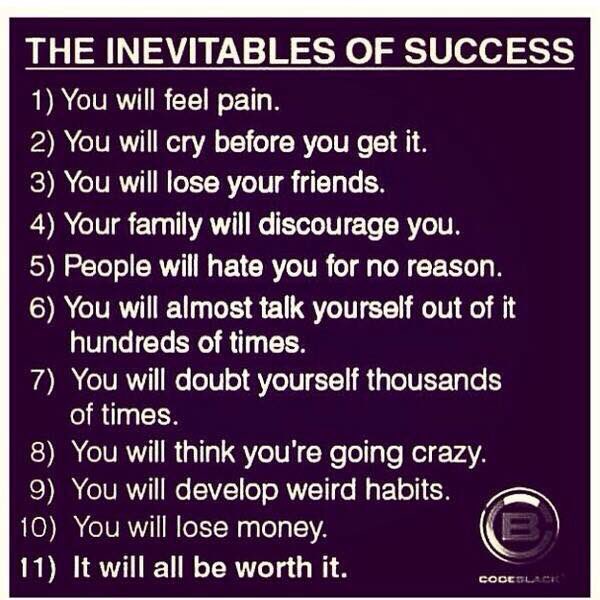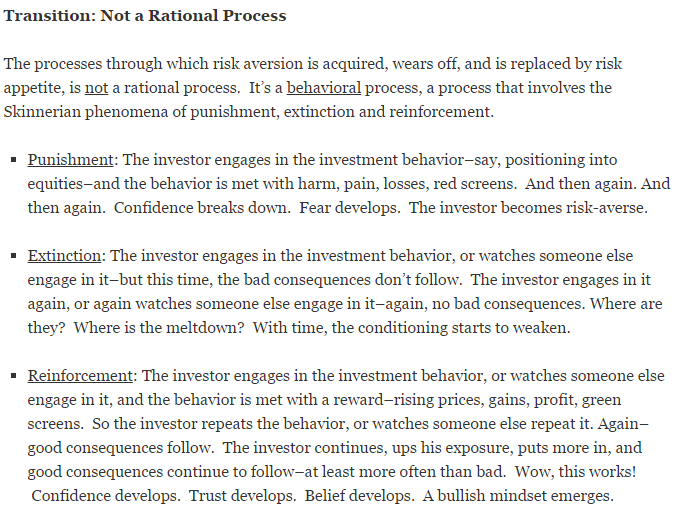
Successful Traders (Only 5% )Knows these Things


Speaking of taking days one day at time, continue to ignore all the prognostications for 2014 with the exception of mine, of course. I do think my prediction is the only one that’s viable: the market will go up, down, and sideways. I’m pretty sure I’m going to be 100% correct on this one. One of the few things I can guarantee. Focus on the long side when the market is going up. Focus on the short side when the market is going down. And, when the market is going sideways: focus on saving lives, do something Creative ,building buildings, repairing automatic transmissions, or whatever great things you do. It’s really that simple. Notice I said simple and not easy.
Never in Life :Waste Time on Movies ,Watching Cricket Matches ,Giving Opinion & Thinking about Politics ,Reading Newspapers…All Waste of Time & Money.
 Mihir A. Desai’s The Wisdom of Finance: Discovering Humanity in the World of Risk and Return (Houghton Mifflin Harcourt, 2017) takes “the unorthodox position that viewing finance through the prism of the humanities will help us restore humanity to finance.” This sentiment is actually becoming more mainstream. For instance, there’s the just published Cents and Sensibility: What Economics Can Learn from the Humanities by Gary Saul Morson and Morton Schapiro. But Desai, a professor at the Harvard Business School and Harvard Law School, outshines his competition in at least two respects: he distills finance down to a few key components, and not the usual suspects, and he brings to bear on them insights from a wide range of often unexpected sources. For instance, “the first chapter lays down the foundations of risk and insurance, with the help of Francis Galton’s quincunx, the author Dashiell Hammett, the philosopher Charles Sanders Peirce, and the poet Wallace Stevens.”
Mihir A. Desai’s The Wisdom of Finance: Discovering Humanity in the World of Risk and Return (Houghton Mifflin Harcourt, 2017) takes “the unorthodox position that viewing finance through the prism of the humanities will help us restore humanity to finance.” This sentiment is actually becoming more mainstream. For instance, there’s the just published Cents and Sensibility: What Economics Can Learn from the Humanities by Gary Saul Morson and Morton Schapiro. But Desai, a professor at the Harvard Business School and Harvard Law School, outshines his competition in at least two respects: he distills finance down to a few key components, and not the usual suspects, and he brings to bear on them insights from a wide range of often unexpected sources. For instance, “the first chapter lays down the foundations of risk and insurance, with the help of Francis Galton’s quincunx, the author Dashiell Hammett, the philosopher Charles Sanders Peirce, and the poet Wallace Stevens.”
In subsequent chapters Desai deals with such topics as options and diversification, risk and return, asset pricing, the principal-agent problem, mergers, and debt and bankruptcy. Again, with exceedingly well chosen examples from the humanities.

“Jack Bogle likes “cheap” index funds. I don’t know why as they are risky and expensive considering the heavy losses, limited “work” involved and lack of skill. If a firm “manages” $1 trillion and charges “only” 20bp, that is $2 billion PROFIT every year even when returns are negative and retirement plans are wrecked! Lose investors’ hard-earned money? It’s the market’s fault not theirs, right? Get someone to make a list of stocks for a benchmark, buy them, and then endure many years below the high water mark! Who would invest in such a dangerous product as an index fund? No-one with fiduciary responsibility.”
 Larry Hite, who was profiled in Jack Schwager’s Market Wizards’ series, spoke recently to a group of students. An excerpt:
Larry Hite, who was profiled in Jack Schwager’s Market Wizards’ series, spoke recently to a group of students. An excerpt:
I believe I had to get into this business because it was simple. There are just a few questions you got to ask yourself. It’s like a checklist that you have to go through. I’m going to go through those questions, discuss them with you, and they can save you a lot of grief. I don’t know that they will make you a lot of money, but mostly they do. I mean, making money in the markets is more simple than it’s not. The trouble is that sometimes you get in the way, or if you’re working for a firm, they get in the way, because there are a lot of social implications. First I’m going to tell you a little about math. I have a guy that works for me, [who] graduated from Wharton, magna cum laude, and we were sitting around one day and we were, I don’t remember what we were doing but we had to figure out the compounded rates of return, and instead of using a calculator we were just looking at the numbers and doing it in our heads. He was young and just out of college, and he kind of felt puffed up about it. You know, it made us feel smart, which is a rare feeling for me. Then I said to him, “You know Michael, the problem with this is anybody can do this with six dollar calculator. You don’t have to be a phi beta kappa. Anybody can do this.”
Larry Hite
Later he continued:
One of the great things about the market is, the markets don’t care about you. The market doesn’t care what color you are. The markets don’t care if you are short or tall. They don’t care about anything. They don’t care whether you leave or stay…I met the guy who wrote this best seller now called, Bringing Down the House, it’s about these MIT guys who beat the blackjack tables. And part of the problem, if you’re going to be a blackjack counter is that the casinos don’t like you. They actively don’t like you. And they come and tell you in rather strong things to take your business away. Well, the beautiful thing about the markets, they don’t like you, they don’t dislike you, they just don’t care. They are there everyday. You want to play, you can play. You don’t want to play, don’t play. And you can choose. You sit, there is no penalty. You know, when you stand you know…I don’t know how many of you play baseball…when your at bat if something comes through the strike[zone], if you don’t swing you still get a strike against you. But the markets are a no penalty game. You can stand there and wait. You can go home and wait. It doesn’t matter. And that’s really a terrific thing.
Larry Hite
Many people lose sight of the main goal of trading the markets. Instead of worrying about making money, they worry about how much they are trading. Keep Hite’s words close, and don’t forget the main goal.
In trading activity alone does not make money, the right activity at the right time is what makes money. Many times the right thing, is to do nothing.
In your actual trading you have to do four things very well to make money.
You have to know when to get in.
Only enter trades that have the highest probability of success and the best risk/reward ratio. Buy the best monster stocks during up trends. Short the fallen leaders when the game changes and they are under the 50 day. Buy the monster stocks at the gift of the 200 day moving average. Short down trending junk stocks. Go where the trends are.
You have to know when to get out. (more…)
